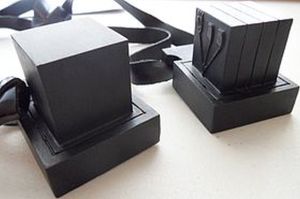In an unrelated incident at Malpensa this morning, security was alerted to a possible suicide bomber when a traveler from Tel Aviv was seen with strings protruding from under his shirt.
 Milan, Italy, March 26 – Security and customs officials at Malpensa Airport report this morning that a man has been remanded to Interpol custody for allegedly attempting to carry several small, handwritten parchment scrolls across international borders in his phylacteries, a set of leather adornments worn by Jewish men during certain prayers.
Milan, Italy, March 26 – Security and customs officials at Malpensa Airport report this morning that a man has been remanded to Interpol custody for allegedly attempting to carry several small, handwritten parchment scrolls across international borders in his phylacteries, a set of leather adornments worn by Jewish men during certain prayers.
The man, a forty-year-old traveling to Tel Aviv from New York, removed the phylacteries from his carry-on bag in the waiting area near the departure gates this morning, and began examining them. Airport personnel and the man’s fellow passengers became suspicious when he appeared to be mumbling into the small black boxes, and alerted security. The man was taken aside and the items were confiscated, whereupon detectors and sniffer dogs determined that they were not, as feared, an explosive or other dangerous device. However, the officials undid the stitches on the underside of the two boxes and discovered exquisitely written manuscripts on tiny pieces of processed animal hide.
Worried that they may have on their hands evidence of an artifact smuggling ring, the security personnel called in an Interpol representative, who assumed control of the investigation. The passenger, who insisted the scrolls were his, was taken into Interpol custody.
In photos showed to journalists, the two leather boxes, each one a cube mounted on a wider rectangular base, was about the size of a small apple, and the two were seen to have different interiors. One’s internal compartment was simply a hollowed-out space where a single small scroll was rolled up, but the other had four separate internal sections, each one with its own piece of manuscript. The age and provenance of the manuscripts, five in total, remain unknown, but they were evidently in good condition, said Interpol spokeswoman Duta Ronimi.
“With the help of a professor at the University of Milan, we have succeeded in identifying the language of the manuscripts as a Semitic one,” she said. “It apparently reads from right to left, and the letters are beautifully formed. This was clearly not the work of someone simply transcribing documents, but of a person putting effort into making each letter a work of art in itself.” She said the handwriting on the five manuscripts was all of the same person, but one of the open questions, aside from the legality and bizarre method of transporting the scrolls, is why the longer scroll contains the same text as the other four combined.
“We think perhaps one was an earlier draft of the other, but it is hard to say which,” said Ronimi. “To the untrained eye, they all look like a final product. But perhaps that is the way it is with perfectionist craftsmen – they spot flaws in their own work that no one else would notice.”
Given the unclear status of the man’s attempt to move the scrolls, the legal options regarding his treatment are limited. He has not been charged with wrongdoing, as no crime has been established. As such, his identity has not been disclosed.
In an unrelated incident at Malpensa this morning, security was alerted to a possible suicide bomber when a traveler from Tel Aviv was seen with strings protruding from under his shirt.




